MORTGAGES & SELF-IMPROVEMENT WITH DINO KATSIAMETIS | E019 PODCAST
LISTEN TO THIS EPISODE ON ALL STREAMING SERVICES
ABOUT THE GUEST
Dino Katsiametis sits down with George Stroumboulis in Newport Beach, California on the Invigorate Your Business Podcast to talk about all things mortgages, financial crises, self improvement, entrepreneurship and faith.
Dino Katsiametis, founder of California Coastal Loans, is an expert practitioner in the mortgage, banking and real estate industries for over 25 years. Dino works with CPA’s, financial planners, attorneys, accountants, real estate and banking professionals in order to provide comprehensive financial scenarios for clients across California.
Dino is an advocate for all things self-improvement and continues to invest in himself and his personal development – also acting as a mentor and coach to others in his industry.
Dino lives in San Juan Capistrano, California, USA. Alongside his mortgage company, Dino founded the popular podcast called “God’s Men of Influence”, where he promotes Christian values by interviewing men in leadership positions in the community about their walk with God, as well as the radio show "Money Matters with Dino". He is a devoted husband and father of four children. He attributes all the good things he has in life to his faith in God and his family.
Website: https://www.cacoastalloans.com/
Dino’s Podcast: https://godsmenofinfluence.org/
Dino’s LinkedIn: https://www.linkedin.com/in/dinokatsiametis/
Dino’s Instagram: https://www.instagram.com/dinokatsiametis/
“And I remember being like 10 years old, and I’d have to sit here and be like, “Oh my gosh, dad, you’re killing me. You’re just killing me.” But hours upon hours of this stuff absolutely sunk into me because I’m the same way he is.”
MEDIA RELATED TO THE EPISODE
Dino Katsiametis sits down with George Stroumboulis in Newport Beach, California on the Invigorate Your Business Podcast to talk about all things mortgages, financial crises, self improvement, entrepreneurship and faith.
Dino Katsiametis sits down with George Stroumboulis in Newport Beach, California at the Ideoli Group office on the Invigorate Your Business Podcast to talk about all things mortgages, financial crises, self improvement, entrepreneurship and faith.
Dino Katsiametis sits down with George Stroumboulis in Newport Beach, California on the Invigorate Your Business Podcast to talk about all things mortgages, financial crises, self improvement, entrepreneurship and faith.
Dino Katsiametis sits down with George Stroumboulis in Newport Beach, California on the Invigorate Your Business Podcast to talk about all things mortgages, financial crises, self improvement, entrepreneurship and faith.
Dino Katsiametis sits down with George Stroumboulis in Newport Beach, California on the Invigorate Your Business Podcast to talk about all things mortgages, financial crises, self improvement, entrepreneurship and faith.
ABOUT THE “INVIGORATE YOUR BUSINESS” PODCAST
The Invigorate Your Business with George Stroumboulis podcast features casual conversations and personal interviews with business leaders in their respective fields of expertise. Crossing several industry types and personal backgrounds, George sits down with inspiring people to discuss their business, how they got into that business, their path to the top of their game and the trials and tribulations experienced along the way. We want you to get inspired, motivated, and then apply any advice to your personal and professional lives. If there is at least one piece of advice that resonates with you after listening, then this podcast is a success. New episodes weekly. Stream our show on Spotify, YouTube, Apple, Amazon and all other platforms.
ABOUT GEORGE STROUMBOULIS
George Stroumboulis is an entrepreneur to the core, having launched several ventures across multiple industries and international markets. He has held senior-level positions at progressive companies and government institutions, both domestically and internationally, building an extensive portfolio of business know-how over the years and driving profit-generating results. George’s ability to drive real change has landed him in several media outlets, including the front page of the Wall Street Journal. George was born in Toronto, Canada to his Greek immigrant parents. Family first. Flying over 300,000 miles a year around the world puts into perspective how important family is to George’s mental and emotional development. With all this travel to global destinations, the longest he stays even in the most far-out destination is 3 days or less - a personal rule he lives by to make sure he is present and involved in family life with his wife and three daughters. To read about George’s global travels, stay connected with his blog section.
STAY CONNECTED WITH GEORGE STROUMBOULIS
STREAM & LISTEN TO THE PODCAST:
SPOTIFY: https://open.spotify.com/show/1rW2CmxQoiJNEPOZupJlvd
YOUTUBE: https://www.youtube.com/user/Stroumboulis
APPLE iTUNES: https://podcasts.apple.com/us/podcast/invigorate-your-business-with-george-stroumboulis/id1607693240
AMAZON MUSIC: https://music.amazon.com/podcasts/8fc03929-71b3-483a-a64e-153e30b3d462/invigorate-your-business-with-george-stroumboulis
iHEARTRADIO: https://www.iheart.com/podcast/269-invigorate-your-business-w-92187370/
STROUMBOULIS SITE: https://www.stroumboulis.com/podcast
PODCAST SITE: http://www.invigorateyourbusiness.com
OTHER SERVICES: GOOGLE, PANDORA, OVERCAST, CASTRO, CASTBOX, PODFRIEND, PLAYER.FM, PODCASTADDICT, PODCHASER, PODCASTINDEX and RSS FEED.
FOLLOW GEORGE STROUMBOULIS:
INSTAGRAM: https://www.instagram.com/georgestroumboulis/
YOUTUBE: https://www.youtube.com/user/Stroumboulis
LINKEDIN: https://www.linkedin.com/in/Stroumboulis/
TWITTER: https://twitter.com/Stroumboulis
FACEBOOK: https://www.facebook.com/georgestroumboulis
TIKTOK: https://www.tiktok.com/@georgestroumboulis
CONTACT GEORGE DIRECTLY: https://www.stroumboulis.com/connect
FULL SHOW TRANSCRIPT
George Stroumboulis: Today, I sit down with Dino to talk about all things mortgages. Dino is an expert with over 25 years in this space, and he has seen it all and has survived and thrived through several financial crises here in the United States. Dino is also huge on the self-improvement realm, has become a leader and a coach to other industry leaders in his space, and is also a host of his own podcast called God's Men of Influence, which includes hundreds of thousands of downloads to date of his podcast. Dino is truly dynamic and an entrepreneur to the core. Please enjoy this episode of "Invigorate Your Business" with George Stroumboulis, and let's get it started.
My name is George Stroumboulis, and I'm extremely passionate about traveling the world, meeting new people, and learning about new businesses. Join me as I sit down with other entrepreneurs to learn about their journeys. This episode of "Invigorate Your Business" starts now.
All right, so we're sitting here today with Dino, and Dino is an expert in several things. What we're talking about today is the mortgage industry, so over 25 years’ experience from the lending side, the real estate side, the investment side, truly an expert here in California, across the country with California Coastal Loans. Also, a tremendous background just as an entrepreneur, and we're going to get into a really cool story about how you started your own business, and that evolved before you got into the finance world, and the loan side. And then we definitely want to cover what you're doing on the self-improvement side because what you've been doing is actually inspiring to me, and we have mutual contacts that are in the coaching space, and, you know, the betterment of you as an individual and how that transcends into the business. So I'm excited to have you here today. I appreciate you sitting down, and we're going to jump right into this. So talk to us, your words, what do you do?
Dino Katsiametis: Yeah, so I own a mortgage company, and it's a big space, but we are very local to our community. Licensed only in California, but 90% of our business is done, you know, just here local and in our space, you know, there's a couple of different ways. There's the refi shops that we call them, and there's the purchase shops. The refi shops are only good when the rates are low. They're only really up and running for a period of time, and then they go out of business, and it's crazy because they get so big and make so much money, but then somehow lose it all in a very short period of time, right? But there's this upper echelon of loan officers that do the purchase business, and the reason why they're a little more upper echelon and I think better at their trade is because, you know, when somebody's buying a house, there are contract dates, there are penalties, right? If you don't close on time, there's moving trucks, there's time off of work, there's emotion, there's all these things that are involved and you're at the center of it. So you have to do what you say you're going to do in a timely manner, versus a refinance shop, you know, the person already owns the home. If it closes a little late, if whatever, they don't care. It's no big deal. And I'm very fortunate that I've been in this purchase space because when the market shifts the way it did, you know, this past year, we're still alive. We're still busy. Right? And I am proud of that because it's a different way of doing business, and it's a relationship as opposed to a transaction.
George Stroumboulis: Absolutely. And speaking from experience, I have no shame in saying this. During the pandemic, I personally was hit. My business was hit, like just horrible times for us, like from expansion, personal finances, but then these rates start getting down into the twos, and it was like such a great time to refinance. So through a mutual friend, they're like, "You got to talk to Dino. This guy is amazing, what his company's able to do." And you know, I was rejected from all the commercial banks and what you were able to do for me with the couple properties that I have and put me in that position, given what I had, I'm like, man, from day one, the way you talk about it, right? Like, just getting on the phone, I'm like, "Oh my God, it's calming, right?" You didn't just treat me, even though you had hundreds of people, especially at that time that you're working with, you made me feel like, man, I'm going to get this done for you. So like, that was huge. And then just the whole process on, you know, I think on one of the first calls I'm like, "Talk to me like I'm a five-year-old, like, what's going on right now? What do I need to do? Here's my information." And you guided me through it. And successfully did it in the worst economic times for me personally. So that was awesome. And then talking with your office and, you know, the secretaries and the teams and the assistant loan officers and everyone that you have in your ecosystem was just like a well-run machine. And just very impressive, right? Just from what you're able to do. And then the other side of it, just on a personal level, "Hey, what do you think about this? If I want to invest, you know, in the next couple years, well, maybe this, and this." You should talk to this person. So you're just like a catalyst in this space. It's not just mortgages. So I just wanted to share that, like, from my personal experience, it was incredible.
Dino Katsiametis: Yeah. You know, again, it goes back to that, it's not a transaction, it's a relationship. And I like to use the phrase, you know, "One plus one doesn't equal two. One plus one could equal three or four, right?" Because a transaction, yes, it's two, but if I'm good to you, you're going to introduce me to several other people, and it equals 3, 4, 5, who knows what. Right? So I look at everybody as a long-term relationship, and if it leads to more business, great. If it leads to a friendship, even better. If it leads to whatever, it's better than one and done.
George Stroumboulis: Absolutely. And which is great to apply to any business, right? Like, I like to sell lighting. It's not just one purchase order. You want to multiply it as much as you can and build a relationship. So there's several different ways if you go from here. Mortgages in general, like how did you get into this space?
Dino Katsiametis: Yeah, you know, it's great because I was actually going to get into real estate and I had every intention of doing that. And I had a friend from college that said, "Dude, you should look at the mortgage industry, right?"
George Stroumboulis: What year are we talking now? Date yourself.
Dino Katsiametis: I don't know, 25 years ago, whatever that was, right? So 25 years ago and I mean, what is that, 1998?
George Stroumboulis: Yeah.
Dino Katsiametis: And at the time, it was the second mortgages were really big, and it was 125% of your value. So they were giving you more money than what your home was worth.
George Stroumboulis: Geez.
Dino Katsiametis: And at the time, mortgage brokers were charging 10 points, right? So if you needed a $70,000 loan, we were making $7,000 on that. And he's like, "It's the easiest money you'll ever make. And it's plentiful. Everybody wants this." So, I'm like, "Done. Let's do it." Got into that. And then literally like two months later, by the time I even learned how to do a loan, two months later, the whole thing crashed. But I stuck with it. And, you know, I ended up loving the business and real estate as much as I liked that and thought that would be fun, it just had a different, like, it was almost too easy, if that makes sense. You know, because your brain was just, it just operated that way. The mortgage piece to me was a lit, it was going to be more plentiful because, you know, the refinance market, right? So everybody I do a loan for when they buy a house. As far as I'm concerned, when the rates drop just a half point, I'm refinancing them.
George Stroumboulis: Gotcha.
Dino Katsiametis: Right? So it's almost like doubling your business. Even tripling, because we refinance the same people over and over again. And if somebody needs cash, sometimes I'll refinance them even if the rates aren't better. There's all these opportunities versus the real estate side. You know, if the person's going to have a move up, great. If the person, you know, wants to buy an investment property, great. But on the refinance side, I looked at it as multiple transactions per person.
George Stroumboulis: Smart. Not a one and done. So you started in this industry, late nineties, there's a crash. Then fast forward a decade, there's another one in '08. Fast forward –
Dino Katsiametis: Well, a couple in between too.
George Stroumboulis: Can you walk us from a high level, like in the United States, because there's a lot of listeners outside of the country. And they always see, you know, documentaries like "The Big Short," the movie. And different people have explained the crises. Is it just a cycle? And it repeats itself because right now we're in 2023 from '98 to 2023. Can you touch just upon that?
Dino Katsiametis: So this was the longest cycle we had of good times. All the other ones were, they came faster and they were a little bit more like this. 2008 was like off the charts, incredibly terrible. But I'll tell you right now, it's almost just as bad as 2008.
George Stroumboulis: See, why is that? Because no one's talking about it. Your average person is not talking about it.
Dino Katsiametis: Yeah. And the reason why, so it depends on how you look at it, right? The crash per se isn't as bad as it was overall, but the mortgage space is just as bad as it was. And when you have rates that were at like two and a half, 2.75 on a 30-year fix and then got all the way to 7.75%, that's such a drastic in such a short period of time that it was devastating to a lot of people. The mortgage space, this was the slowest we've been since 2008 and prior to 2008, it had never been that slow before. So all of the going back to that original thing I said, how there's the refi shops and the purchase shops, all of the other little hiccups, you know, weren't that bad because I was always a purchase guy. Right? So even though it slowed down, it was never that bad in 2008. I mean, it shut down. So you couldn't even get a loan. It was just difficult.
George Stroumboulis: For how long, like how long were you out of commission for?
Dino Katsiametis: So, it was probably a good six months where it was like, "Oh boy, okay, what is happening? Can't even get a loan," right? Like all the banks were shutting down. All these things were happening. It went from getting a house with zero down to 5% down to 10. You couldn't even get, you need a 20% down for a minute and who's got 20%? So if you have a house that at the time, let's say was like five or 600,000 and you were used to, okay, let's just say 10%, right? 60 grand. That's doable. It's doable for a lot of people, but all of a sudden you needed 120 just not going to happen. So the price of the house, let's say it goes from 600 to 500, it's still a hundred grand, right? Goes from 500 to 400. It's still 80 grand. All of a sudden it starts becoming a little better. But that's what caused so much of the steep decline in such a short period of time because the spigot for getting a loan got turned off.
George Stroumboulis: Turned off. But why was it allowed? Like back in the nineties you said they were giving money 125% of the value. So a million-dollar home. Why that extra 25%? Like why was the structure like that?
Dino Katsiametis: In banking, there's this fine line, fear and greed. When greed kicks in, which is the majority of the time, everything goes, "Let's make some money." And you got to realize what the majority of these mortgages, they put them together and they get rid of them. So it's like a hot potato. As long as you're not hanging onto it, you're okay. So, that's why it was allowed. And after 2008, you know, a lot of new rules went into place and it became a lot more difficult. But greed once again kicks in and then creative people find creative solutions, right? And all of a sudden things start coming back. Now it's not nearly the Wild West like it used to be. So there's still a lot of checkpoints that you have to stop at, right? And there's things that you have to do, but it's kind of, even the government is kind of coming back into it, right? When they tighten up too much and things get difficult, you know, they're putting stuff on us to tighten up. But then when it gets too tight, they're coming up with solutions. Like just recently they came up with this dream for all program. We're going to give you 20% down. You don't even have to pay us. You're going to give us a little percentage of the profits one day when you sell, but you don't have to pay us. Well what's that doing? That's just as creative as what these banks were doing to try and give people –
George Stroumboulis: Giving 20%.
Dino Katsiametis: Yeah.
George Stroumboulis: So, a dream for all, for example, and this is good just for people. What is that? Is it a certain income bracket can apply for this? Or how does that work?
Dino Katsiametis: Well, that's where this really opened up. It became available to the majority of people.
George Stroumboulis: Okay.
Dino Katsiametis: The problem is, there was two problems with it. One, they barely funded it, meaning it ran out of money in like two weeks. I mean, what's the point? Right?
George Stroumboulis: Yeah.
Dino Katsiametis: But then I think they kind of went about it all wrong. I get it, their goal is to get people in the houses. But what they did is they caused a bigger problem. And here's why. Because in Orange County specifically, right? But all of California, but let's just say Orange County, since that's where we're located, the housing market was already hot. And the reason why it's hot is because they're super low inventory. There's nothing available. So when something comes on the market, it's like a yep. Right? Everybody flocks to it. So we were already, it had slowed down quite a bit, when the rates went up. But come February, it really picked up a lot. All of a sudden, multiple offers, again, everything got crazy and all because the rates dropped from high sevens to high sixes. And now even like low sixes is where we're at now. So all of a sudden, the market's picked up and it's going again. The problem is 20 offers on every property, right?
George Stroumboulis: It's insane.
Dino Katsiametis: Now the prices are going up quickly, we're having appraisal issues again. Right. And you got to be super creative to get your offer accepted. When the dream for all program kicked in, we had a client that was trying to get it, which I thought was going to be a waste of time. Because it's like you can't even get an offer accepted sometimes. So now you're trying to go in with zero down and get an offer for accepted. I talked to the listing agent and said, hey, out of curiosity, I'm trying to kind of, you know, get some background. He goes, we had 35 offers on this property, 20 of them were regular, 15 of them were dream for all.
George Stroumboulis: Geez.
Dino Katsiametis: So imagine now what happened to the price of that home, thanks to the dream for all, it made buying a house even more difficult.
George Stroumboulis: That's insane. So it's making it even more difficult. And the program ran out in a couple weeks.
Dino Katsiametis: Ran a couple weeks. They didn't realize that that’s right but everything has cause and effect.
George Stroumboulis: Yes.
Dino Katsiametis: So if you need to fix the problem, I think the problem is how do you get people to sell a house when they have a 2.75% interest rate? You got to get them out of that house to open up the inventory. Because if they don't, if inventory doesn't open up, then you're going to have the same problem.
George Stroumboulis: So, you’re in a bubble down here, like an amazing bubble. Orange County, obviously it's by strategy. You're born and raised here. But this has just been crazy, even for myself looking at homes and trying to get in here, the market even it's gone crazy. And even now there's no inventory, multiple offers. So is that by strategy, why you've stayed here and, you know, why do you want to expand across the country? You're in such a good bubble that's been feeding you for 25 years.
Dino Katsiametis: For the first time, I actually thought about some other states because for the first time, so many people are leaving California.
George Stroumboulis: What was driving like the first time? Was it just politically, was it business wise or a combination?
Dino Katsiametis: I'm in Orange County, so I hear a lot of the political, right? Because it's so conservative.
George Stroumboulis: It's ingrained. Yeah.
Dino Katsiametis: But at the same time, they're just some of the louder people. So everybody thinks that's all it is. But at the end of the day, I mean, thanks to the pandemic, everybody can work from home. So you don't have to be somewhere. And there's a lot of people, they cashed out because the housing went up so high and then got into something cheaper. So it's like a great retirement move. It's a great financial move. Problem now is you got Texas, you got Tennessee, you got Idaho. Prices of homes there are not that much cheaper.
George Stroumboulis: Exactly.
Dino Katsiametis: They've gone up a ton. So, going back to answer your question, I've always said I stand within more money at all times just here in Orange County that I don't need to go anywhere else. If I put all my attention and focus on my own hometown, there's more than enough business. And I've always used the example and you know, the big boys, right? Like Rocket Mortgage, Loan Depot, some of these big online internet banks, they have to make this much of the entire loan business in the entire United States just to break even. I have to do this much just of Orange County to make a lot of money.
George Stroumboulis: So you touched upon something, we've had conversations about this. When you try to expand and you try to grow and you try to go out there and you're not laser focused in your strategy, what are you really chasing? And what you just said, just that simple example. Like just to break even what they have to do versus, man, this is a great market. I can have a great lifestyle. I can support several families that work in your establishment. That's just great advice. Like be laser focused and if it makes sense, grow.
Dino Katsiametis: I've become such a huge proponent of laser focus and, you know, just niche products. It's so hard to comprehend, especially when you're younger, that if you only do this, you're going to make more money. It just seems more logical that if you can do all of this, you'll make a lot more. But the truth of the matter is, you know, I always use doctors as an example, doctors that are specialists in something. If you get sick and you go to a general, you get right in, right? Within a day or two, sometimes a week at the most if they're great. But if you have a real problem and you're going to die, it's like a two-month list.
George Stroumboulis: Yeah, absolutely.
Dino Katsiametis: List to get in.
George Stroumboulis: Well, they're just redirecting you to where you need to go. The specialist.
Dino Katsiametis: Absolutely. And guess what? You're paying five times as much money. So, that's I think in any business, that's what you do.
George Stroumboulis: The specialists. Yeah.
Dino Katsiametis: Specialists.
George Stroumboulis: So talking about mortgages and again, the people, we have a lot of listeners in Canada, in Europe. Let's give them an example and try to take, you have very wealthy clients and then you have other ones that are just trying to get into their first home. Right. But if you took the middle of the road and said, hey, the average home price that you're mortgaging, what number is that? Let's say two and a half million. 2 million. Let's use a round number 2.
Dino Katsiametis: I'm going to say the average first-time home buyer in Orange County is somewhere around seven to 800,000. For the first time ever, we've had lots of first-time home buyers buying over a million, which before, a first-time home buyer was four, five, maybe 600,000.
George Stroumboulis: Yeah. Which is insane.
Dino Katsiametis: Which is insane.
George Stroumboulis: So first time, so Orange County, beautiful area here in California, United States, obviously. So first-time home buyers, say about 700,000. And then typically, other clients you have, what would you say an average new home price would be?
Dino Katsiametis: Yeah. So you're looking at somewhere around the 1.5 to 1.8 market. Now, I think where you're going with it is, yes, Newport Beach, totally different story.
George Stroumboulis: Different Animal.
Dino Katsiametis: Completely different animal. It's not the norm, it's not like what most people are like, right?
George Stroumboulis: It's just absolutely insane here. And then you see the prices and what you get. Yeah, it's another world. So talk to me, the $700,000 first-time home buyer here in California, in Orange County. What's the profile of that family or new couple, and what do they need to get in there? I just want to compare because it's so different. Canada's so conservative when it comes to, you know, financing. I just want to put in perspective for the listeners.
Dino Katsiametis: Yeah, sure. So, first of all, as a business model, I'll tell you years ago, it's been probably eight years ago, nine years ago, I kind of made a switch and I went away from what I had been doing, which was a little bit more of a higher-end client and all that stuff. And I specifically went back to first-time homebuyers, and it was a tough decision because they're a little bit more of a pain in the, you know what, they're a little bit more, you know, green, around the edges and, you know, just kind of emotional.
George Stroumboulis: Yeah, emotional.
Dino Katsiametis: But I learned how to work with them. I learned what it is that I had to start doing a little bit different. Because I had to change my method. And ultimately it was the best thing that we did. And the reason why is because there are so many of them.
George Stroumboulis: Okay.
Dino Katsiametis: There’s just so many of them. And if you look at the birth rates of people over the next several years, there's not much of a decline. I mean, like, it started with the millennials and then it just kept on going. So if you look at the average age of a first-time homebuyer, it's about 34 years old.
George Stroumboulis: Okay.
Dino Katsiametis: 34. So the way to predict what's going to happen is you look at the birth rates 34 years ago, and then you can say every year after that, and if there's any kind of a decline in births, then you got yourself something to worry about. But you can forecast this out for years to come. There's no decline. Lots of people were being born.
George Stroumboulis: Smart.
Dino Katsiametis: Something really fascinating is back in 2008, you know, people can blame all sorts of things about why we had such a big crash. But one thing nobody realizes is, I think, it was like 33 or 34 years prior to 2008. Do you know what happened?
George Stroumboulis: Lower rates?
Dino Katsiametis: Nope. Huge, huge decline in births.
George Stroumboulis: Ah, okay.
Dino Katsiametis: You know why?
George Stroumboulis: And that's what I meant. Sorry. Lower birth rates.
Dino Katsiametis: Because they legalized abortion, and we had the steepest decline in birth rates ever in that one year when it happened. And then now you don't realize consequences or anything. But fast forward 33 or 34 years later, 2008 hits. And yes, there was a lot of things that transpired. But everything is like a house of cards. And all of a sudden, you know, there's not enough people coming into the market.
George Stroumboulis: To feed this Tiffany scheme.
Dino Katsiametis: To feed the Ponzi. It's a Ponzi scheme. All of it is.
George Stroumboulis: That’s Interesting.
Dino Katsiametis: Not enough people to buy cars, houses, appliances, all the other stuff that comes along with it. And all of a sudden it stops, and all of a sudden it exposes all of the BS that was actually going on. Now maybe if the birth rates were still high, nobody would've noticed.
George Stroumboulis: Or it would've just pushed it out several years, or whenever.
Dino Katsiametis: Yeah.
George Stroumboulis: Okay. So that's great to know. The $700,000 first-time homebuyer in Orange County gets a two-bedroom home. Average profiles, a 34-year-old male or female.
Dino Katsiametis: Yeah.
George Stroumboulis: What do they typically earn? What do they typically need to put down to get into a $700,000 home?
Dino Katsiametis: Yeah, so it's pretty easy. Like we've gotten pretty relaxed on stuff. So a lot of them will do, there's the FHA loan, which is three and a half percent down, a conventional loan, which is typically the better, longer-term route, 5% down. The average, I would say, for my people is between five and 10%. And know in the lending industry, every 5% more that you put down makes a little bit of a difference. So every 5% gets you a little bit of a better deal.
George Stroumboulis: Mm-Hmm.
Dino Katsiametis: On your credit score every 20 points also gets you a little bit of a better deal.
George Stroumboulis: Every 20. Okay.
Dino Katsiametis: Every 20. So if you have a 719 credit score, you're one point away from something better. So I always tell my clients when we look at your overall profile, we're not going to just tell you this is what you qualify for. I'm going to look at it and say, look, you're one point away and you'll qualify for this much more. Or you're one point away and you'll save this much more. And there are little quick fixes almost always that we can do. Okay. Almost always.
George Stroumboulis: So, you're always walking them through that. You said you switched from your model about eight, nine years ago. What did you do to, like, what are some stuff? Because the one thing I noticed when we were going through the process as a client of yours, the whole digital side, you use digital to your advantage and you maximize your time where it's, hey, instead of getting on a phone, I'll walk you through this. Great. You're always available, but then there's the digital side where you're recording the step by step on, here it is. So I can play it back or share with my wife. I feel like you utilize a lot of online tools to maximize your time.
Dino Katsiametis: So it's interesting because it starts with how do I get those clients and, you know, all the tools I have later is how we'll keep them and grow. But how do we get them? And it's actually the way I got you. Yep. I specifically went after referral partners that were young and weren't necessarily at the top of their game just yet. Right? But I was not too old, just kind of old enough where I'd been in the business for a while and I could help coach them up a little bit and help them grow their business. But all of those people, like real estate agents in particular, they had, because of their age, they had younger clients. So I specifically went after young real estate agents.
George Stroumboulis: Smart.
Dino Katsiametis: Which then brought me the young clients, and the beauty of, I would say, Orange County specifically, kind of like the higher end of Orange County, they're not factory workers, meaning they don't get 2% raises every year, they don't buy a house and be like, we're done 30 years. We're going to live in this thing. They buy a house making probably together as a couple, somewhere around 150, 180,000. And then two, three years later they're making 220. Other people, they're making little incremental jumps so they don't have the ability to scale as quickly. So our people will buy that property and then two years later, for tax reasons, wait two years, sell it, maybe two and a half, three at the latest. They sell it, they move up.
George Stroumboulis: Gotcha.
Dino Katsiametis: So there's a huge turnover even faster with them versus somebody that's buying like a $1.6 million house. They don't necessarily aspire to get to a two. It's typically a nice house, it's in a good neighborhood. They're going to finish raising their children there until school is over. And then they'll decide what they're going to do. Versus the younger, maybe no kids yet. Maybe brand-new little babies, maybe another kid or two on the way. They grow out of stuff a lot quicker.
George Stroumboulis: Absolutely. Okay. So that's great to hear. The mortgage industry in general. You have a big family, beautiful family, boys, daughter?
Dino Katsiametis: Two girls. Two boys.
George Stroumboulis: Two boys, two girls. Okay. So let's open it up. Would you, and are you aspiring for them to be in this industry? 10 years from now? 15? Because you've struggled. And I feel, especially in America, it's like work hard, make your money, anything's possible. And that's why we all love America. But in this industry, you were enticed to get in it because it's like, hey, we can get rich quick type of thing. But you stayed in there and you found a way to navigate. Is this industry still like get in there, get rich quickly? Or is it a long game and do you think there's a future for, you know, your kids to be in this? Or people who are aspiring?
Dino Katsiametis: Oh man, I don't know. I went to a Tony Robbins seminar seven or so years ago and he said something, it was business mastery, which by the way, I recommend to everybody, anybody who's in business. Awesome seminar.
George Stroumboulis: Three day, that's like a three-day program?
Dino Katsiametis: I think it was three or four days.
George Stroumboulis: 10-15.
Dino Katsiametis: It was like 10 grand at the time. Probably a little bit more now, but totally worth it.
George Stroumboulis: Worth every penny.
Dino Katsiametis: Worth every penny.
George Stroumboulis: Shout out Tony Robbins
Dino Katsiametis: Yeah. Shout out, man. So he said something that I thought was really good in the old days, like GM and Ford and, you know, all of these old established companies, they stuck around for a hundred years plus, right? Any company that opened up, it was sticking around for a long time. If it didn't go out of business, it was going to be around forever. Nowadays, the industries are just shifting so much. We got ChatGPT now. Is a writer going to be in business much longer? You know, you can write an entire book with ChatGPT. There's so many different things that are changing. Will a realtor be in business in 10 years? What he said was that what used to come around in a 20 or 30-year cycle is happening in a year. So you have to sit back when you're self-employed every year and pretend like you were going to open this business up again for the very first time and what would you do?
George Stroumboulis: Gotcha.
Dino Katsiametis: And if you do that every year, you actually stand a chance at trying to not sustain business but grow a little bit. Because you have to keep innovating versus before you establish the business plan and you just stuck with it. You didn't have to do anything. Things are changing so fast. So you asked me about the kids and I don't know, you know, I don't know. All I know is that my dad came from Greece. So we have that in common. And I remember my dad saying the great thing about America is that it's the easiest place in the world to make money. You can make so much money doing so many different things and you'd be amazed to know how some people became millionaires. So, you know, always have your eyes and ears open, he said.
George Stroumboulis: It's great advice.
Dino Katsiametis: Great advice.
George Stroumboulis: Because you came from a place, no matter how driven or smart or powerful or not, there's a system you can only go so much. Right?
Dino Katsiametis: Yeah. So when you ask about the kids, it's like, I mean, sure. It sounds amazing that I would be able to pass it on to the kids. In fact, my oldest daughter who was 17, started talking about it and you know, and then she saw this slowdown happen and she's like, I think I'd be better off. Like I want a job so I can make sure I get a paycheck. And then I was like, right. I got some more teaching to do to her. Because, and I tried telling her like, honey, just so you know, if you have a steady job and you get a steady paycheck and that company starts going under, guess what? You get fired and you no longer have a steady paycheck.
George Stroumboulis: Exactly.
Dino Katsiametis: So there's no difference. Only you're limited as an employee. You're unlimited as an employer.
George Stroumboulis: Well, look, our parents immigrated from another country. They obviously left because it was a global setting. They come here better life, they struggle. So we could have a better life. We're having a better life. We created an even better life for our kids. So it's like that cycle. Well, how does it go? Hard times create hard people. Hard people create good times. Good times create weak people. So it's that cycle, I don't know it, it's hard to say for your kids, you know, you just want to give them the best and put them on that path. But kids aside, in the mortgage industry, if you look at someone who has their own company, someone who works within on different layers is it a good career? Like people that join them and you're, you're explaining their career path because you're big into coaching. What can someone make in this industry in certain tiers?
Dino Katsiametis: Yeah. I still say, I don't know what else exists that can make this much money doing so little. And I can tell you that it doesn't matter how good you are at numbers cause that's not what makes you all the money, right? The new systems, the new technology can do all of that for you.
George Stroumboulis: Plug and play.
Dino Katsiametis: Plug and play. You know, granted when you called me, you needed my expertise. That was a little bit of an old school that I had to bring out. I haven't had to do down in a long time because everything is kind of just plug and play. And as a business, I prefer that because everybody else on my team can do it.
George Stroumboulis: And you could scale it.
Dino Katsiametis: Yeah. When you call, I had to do it, you made me work. But I enjoyed it. Right? Like I still enjoy doing that, but at the end of the day to scale, I need a little more plug and play, which is the average person. But I tell the young guys that are looking to get in this industry, and again, I don't know about my kids because they're still too young. But anybody looking now, there is an absolute career in it. You can absolutely make a ton of money, and it is absolutely unlimited. That's the beauty of it. But you have to be good at marketing because if the phone doesn't ring, it doesn't matter how good you are at anything else. Right? And I believe that to be anything, whether you're a doctor, a lawyer, or whatever. Right? A real estate agent, a mortgage broker, a lighting specialist. If they don't know what you do, nobody will give you business.
George Stroumboulis: Absolutely.
Dino Katsiametis: And then there's a lot of little things that make up how great you are. Right? Like the team, the technology you use inside to communicate with everybody. You mentioned earlier that we do a lot of video work, and we do, and it's a way that I can communicate with somebody eye to eye without being face to face. And they know because I can convey as I'm staring at them that I actually care. I can convey my message. Right? Versus on the phone or an email, we're trying to get away from that, and we're finding that it's actually saving us a lot of time cause we can convey the message better, more effectively through video, and they can go back and rewatch it. We also do a lot of screen share to show them that if you do this, let's look at the, look how this changes. If you get a condo with an HOA of 500, how it changes your buying power. Right? Or if you buy a house with a high property tax rate, it changes your buying power. Right? And we're able to show them this, which you can't just explain that to somebody. And using technology is absolutely a must. Anybody young, I tell them a hundred percent, this is an incredible career path for you. And the reason why is because everybody else that's doing it old school is my age or older. Right? The average age is even older than me, and I'm 52, so they don't have many years left. And everybody else in the industry is working for one of these big companies. So, all they are just order takers. They're never going to be at that next level, right. They're the refi shop. They wait for the phone to ring; we make the phone ring. So I tell the young guys, if you are all in, I'll teach you how to do all that stuff. I'll teach you how to hunt, and you'll have a career that surpasses anything you can imagine. And the beauty of it is that it's very much a one plus one doesn't equal two, right. It can grow exponentially because if you do this the right way, and if you look at the younger generation, they don't want to deal with a 60-year-old. So you'll have years and years and years of these clients and their referrals and other friends; you'll grow with them. It's a great time to do it because the generation is so large, and they don't want to deal with the old guy.
George Stroumboulis: Okay, so aside from hard work, right, and understanding and learning and latching onto someone who's willing to teach them, right, what other requirements do they need? Like, do you need a university degree? Do you need a college degree? Can you be a high school grad and just be hungry as heck? Like, what, if someone's interviewing with your firm today, what would you like them to have?
Dino Katsiametis: You don't need any of that stuff. What I really like is hospitality. If you have any kind of hospitality background, I know you probably have what it takes to do it. And what I mean by that is simply, well, let me back up. We have a saying that we use on everything. It's a hashtag, #WhoCanWeServeToday? It's me, who I am as an individual. So I put it on the company, and I always ask everybody, you know, are you willing to serve? And if you're willing to serve, I think you'll be just fine. And you know, I'm trying to implement things so they don't have to. In general, a loan officer or a realtor is a solopreneur. They do everything, right. And you can't do everything by yourself. So I'm trying as a company to do all of the extra stuff for them and just teach them how to go out and make friends.
George Stroumboulis: And make friends. That's incredible. Transitioning, right? So we're talking this industry. I want to share with everyone, like just your entrepreneurial background. You studied college here, right? We've got to talk about the Levi's, the Levi's story. Because I think it's incredible. Just if you're an entrepreneur, you are, it's ingrained, and this is pretty cool. So you started in your college days, something triggered your eureka moment about Levi's jeans. It was the epitome of American culture. You know, Levi's jeans were a global sensation at one point. And just talk to us, like what you recognized when you were in your late teens, early twenties, and where you built it.
Dino Katsiametis: Yeah. So shout out to Tyler, a friend of mine in college who landed this gig with a guy from Japan that said, "I'm going to pay you." I forget, it was like a 40-grand salary, and the only thing you have to do is go and buy things for me instead in Japan. And they were typically new things, right, like leather belt, leather bags, all these different American things. And then one day he said, "I need some used Levis." And I was like, "Gosh, where am I going to get used Levis?" So he went on the hunt, found some guy in Texas that was buying him at a university and just crushing it. And he said to me, he's like, "Why don't you do this at your own school?" So I put a couple ads in and it, I've got a few jeans and all that. And then I finally went and I got like a table around the bookstore. Usually, they would have tables selling stuff. Sure, all day, every day, all year long. And I managed to get myself a table for one week. And I remember, and I did it with a couple other friends, my roommates at the time. Right, we were all partners on this. And we only got like a couple pairs in and a few more the next day. And then we were just like, "Wow, this is now working out the way we thought." Meanwhile, we're not going to class because we're trying to make money. Even though we're right there on campus, you know, we were skipping class. Right. So we started going out with flyers and handing them out to everybody. Just old school tactics of trying to get business. And it worked because we ended up getting like a thousand pair that next day and like a thousand pair the next day. And then we were like, "Okay."
George Stroumboulis: You're just paying out of your pocket on the spot.
Dino Katsiametis: Yeah, between one and $10 and everybody's bringing in all their old Levi's. And it was great. And we're like, "We need to come back here again now". Like, we can't wait. But we couldn't get in right away. We had to book it out. But this time, you know, we were like handing out flyers beforehand saying we were going to be here for a week. Right. And we crushed it. We got a ton. And then somewhere along the way I broke off from them and I went and did it myself. I'm greed, fear and greed. And I ended up going on a street corner in Fullerton, Euclid and Harvard, I think, gosh, I don't remember. There was some gas station was there and I was like, "Hey, can I give you a couple hundred bucks? Will you let me sit out here on a beach chair with a banner saying, “Cash for used Levi’s?” And he said, "Sure." So, I did that and again, barely got anything in. Nobody knew about it. And I remember I was kind of depressed because I just left this school thing where we were actually going to several schools at that time. Right. And we were doing well and I thought I was going to crush it out here and I wouldn't have to travel to Santa Barbara or San Diego or all these different places. And I was in college. We were at dollar drinks somewhere. And I remember seeing this really beautiful girl working there selling beers. And I remember talking to her and I said, "Would you ever consider doing a side gig during the day?" She said, "Like, what would I have to do?" Said, "All you have to do is wear cowboy boots, little Levi cutoffs and a bikini top."
George Stroumboulis: So after she slapped you, what did she say?
Dino Katsiametis: And hold up a slide that says “Cash for used Levi's”. And before she slapped me, she said, how much does it pay? So as soon as I said, 20 bucks an hour, which back then, which was like 1990, she was like, yeah, I'll do it. No slap, no nothing. I'll do it. I'll see you tomorrow. So I'm out there, still nothing. And then she comes out, holds up this sign, walks back and forth on the street corner. And I'm telling you, man, it was like chaos was happening and everybody wanted to stop to see what I was doing. Right?
George Stroumboulis: Yeah, not her. Of course.
Dino Katsiametis: By the end of that day, around like two, three o'clock or so, all of a sudden, they just started coming in and coming in. And I forget how many I got, but several hundred pair. And the next day, I got like over a thousand.
George Stroumboulis: Pre-social media.
Dino Katsiametis: Pre-social everything. Right? And then on my best day, I got like 2,000 pairs. I was running, I ran out of money. I'm calling my guys that, you know, that I'm selling stuff to. And I'm like, you guys, somebody needs to get over here right away, otherwise we're going to miss out on a lot. So some guy from LA that I was selling a lot of jeans to at the time, he drove down, immediately handed me like $10,000 in cash.
George Stroumboulis: Just to buy inventory.
Dino Katsiametis: Yeah, just keep buying. And he took a bunch of jeans that I had. And then that just opened the door. I did it again. And I ended up getting shut down by the city. Of course, apparently you needed a permit to do this.
George Stroumboulis: Details. I'm like, come on.
Dino Katsiametis: So I said, okay. I packed it up, she left, I came, I went right back out there and did it again. She came back again the next time and shut me down. Brought a police officer and then I stayed away. I came back a week later and she showed up again like the next day. So I was like, okay, this isn't going to work, but I'm onto something. What am I going to do? So I opened up my first, I was looking for a location. I found this little 300 square foot, nothing. And I went in there like it was vacant. The guy, the owner, the strip center was painting it, said, hey, I'd like to rent this. And it was literally $300 a month to rent it.
George Stroumboulis: From a hobby at school library right outside of the bookstore to like gas station to storefront. All within a couple months.
Dino Katsiametis: No, that lasted for a little over a year or so.
George Stroumboulis: A year, okay.
Dino Katsiametis: And I had just graduated college, and I literally did this right away. And that thing exploded, man. It totally took off. So then I opened up, well then, I also had an outlet because people would come in and sell. And I had a few racks out there that I was selling stuff. The good stuff was going to Japan, Europe, Israel, Australia, and the bad stuff, all of a sudden, all the Hispanics were coming in and like the acid to wash jeans that were like nobody wanted them at the time, I was selling two for $10 and I was buying them for a dollar a piece. So $2, and I was selling them for 10, and those were the bad ones.
George Stroumboulis: And those were the bad ones.
Dino Katsiametis: Yeah. And that worked out. So I was like, "Hey, this is good. I'm going to open up a second store." And I opened up another one, a little bit bigger for more retail space, still awesome buying, like, I'm buying hundreds of pairs every single day. Right. I'm selling all the bad stuff there and wholesaling all the good stuff. And then a third, fourth, fifth place. So I had five retail locations.
George Stroumboulis: Locations, all in Orange County?
Dino Katsiametis: In Orange County. And between that and wholesaling, it was just, I mean, I was in like mid-twenties, man. It was such a good life.
George Stroumboulis: Single. Girls coming in, cash in your pocket.
Dino Katsiametis: Yeah.
George Stroumboulis: And then what happened?
Dino Katsiametis: So I'll tell you, before I tell you what happened, dealing with foreigners is no joke. They're not American. They don't deal a certain way. So I got to learn a lot about people. The Japanese, which was a big piece of it, were very respectful. Hard negotiators, but the second they committed, it was done. Shake their hand, and it's their word. I remember dealing with some other cultures. Right.
George Stroumboulis: Sure, it’s safe.
Dino Katsiametis: Yeah. And all of a sudden, it was all different. And I remember I had one of my biggest loans, and it was about $10,000. And the whole business was cash back then, right? So it was great. And we're going through literally each and every pair of jeans. It was like 2,000 pairs of jeans. So we're going through each one. You grade them, you look at them, you do this, you throw them in a pile, and then you count them all up, and you know, you get your money. Well, through this two- or three-hour process, the guys psychoanalyzing me and talking with me were becoming friends. And then he realizes that I'm just a young kid, and you know, that I don't have a ton of money, and I've got these stores and this and that. And now I'm all excited cause it's time for the payday. And he just lays it right on me and says, "You know, I'm not going to be able to purchase these for what we agreed for upon. It's just not that good." And I'm like, "What do you mean it's not that good?" And he goes, "Well, just the quality is not as good." I'm like, "Well, you separated them into your own quality." And he goes, "Yeah, I'm just not going to be able to do it”, knowing that I needed the money. Right. So, then this was the Greek in me. I didn't know exactly how to handle it, and I couldn't walk away because I did need the money. But at the same time, the Greek in me said, "Alright, I'll make you a deal. Let's flip a coin. If you win, you can have your price," which was like, I think $2,000 less than what we agreed on.
George Stroumboulis: It's a good chunk of change. Right?
Dino Katsiametis: Yeah. If I win, you're going to give me $2,000 more than what we agreed on. Right. So 8,000 or 12,000. And at that point, I was like, I am going to take this one way or another cause I need to walk away with money. Right. And he said, and he was of culture, and you know, people of culture loved to gamble.
George Stroumboulis: Yeah.
Dino Katsiametis: So he was in. And I said, but I go, "You're going to keep your word this time. Right?" He said, "I'll keep my word." Flip the coin. I won. I got my $12,000.
George Stroumboulis: No way. Geez.
Dino Katsiametis: So, but lesson learned. We left it at that. I walked away. But lesson learned Right. Negotiations come in many different ways. It's not just negotiating a price one time and being done. They're going to psychoanalyze you. They're going to know exactly and then they're going to hit you hard when they have an opportunity. So I learned an awful lot during that period of time about how things are done. Right. And different cultures, I know you work in a lot of different countries.
George Stroumboulis: But that's a real-life lesson on you need to get burned a few times until you're like, okay, let's not do this again. That's huge. So you go through that process like that, that's a pretty spectacular chapter. Like your own retail operation from scratch. Right.
Dino Katsiametis: So then, to answer your question, what happened, right? So then it must have been 1997 or so, somewhere around there because it was right before I got into the mortgage business. The Japanese economy just literally crashed. It was done. And just like that, jeans we were selling them for like 30, $35 were now going for like 15.
George Stroumboulis: And you're buying them from one to 10. So it's like, yeah.
Dino Katsiametis: So it completely changed. And then I'm like, "Alright, well, thank God we still got the Europeans and the Australians." And they're no dummies. The second that happened, they were like, "Yeah, that's the most I can pay."
George Stroumboulis: Isn't that amazing how fickle we are?
Dino Katsiametis: Yeah. So it quickly changed, and I learned a lot of valuable lessons. If I could do all of it over again, I wouldn't have done all the retail. The retail, you have a lot of employees, you have inventory that sits out on racks. You have to learn how to manage inventory. Right? Wholesale was just a whole different beast. You don't need expensive retail stores. You can be in a little, you know what? Warehouse in the middle of nowhere, nobody even knows what you do.
George Stroumboulis: Maybe a security system or something and call it a day.
Dino Katsiametis: A bunch of racks in there to kind of organize things and that's it. Loud music playing for yourself, and you're good.
George Stroumboulis: And this is pre-internet. So online sales didn't really exist.
Dino Katsiametis: Yeah. So when the economy died, it immediately changed everything. And what I realized is that my retail business, because I went from those acid wash jeans, two for $10 to nicer and nicer and nicer stores. And the nicer stores kind of sank me.
George Stroumboulis: Okay.
Dino Katsiametis: It changed everything. Right. So if I could do it all over again, I wouldn't have spent all this money opening up beautiful stores with high-end inventory and all this other stuff. I would've stayed cheap and inexpensive. Right. And it's profit, I mean a big, huge warehouse to store thousands of jeans that you're wholesaling. At the end of the day, the monthly cost of that with maybe one or two employees is nothing compared to all of these.
George Stroumboulis: Five locations. Everyone, this, that, like, that's insane.
Dino Katsiametis: And even though it was young, once you get used to making money, it's hard to go back. All my friends and, you know, graduated from college had a good job. They were making like 60 grand. The good ones had an expense account so they didn't have to pay for their own dinner. And I was like, how do you guys survive? How do you guys do this?
George Stroumboulis: You're rolling up with cash from all these locations and everything.
Dino Katsiametis: Yeah, every day.
George Stroumboulis: Propelled you though to want to just continue to keep cash.
Dino Katsiametis: So then you kind of, you know, what I did is I closed a couple stores, I sold a few. And learned a lesson there too. But you know, there's a lot of lessons to be learned and the Bible says consider it pure joy, my brothers and sisters. You know, and it's like when things are difficult, that's when you're shaped as an individual. So, you know, as difficult as times have been over the years, I look back and I'm like thankful for everything I learned during that time. I'm also thankful for how stupid I was at times because you can learn a lot from that too.
George Stroumboulis: Oh, my God, and you didn't have mouths to feed. Married, kids, like more headaches. Like that's the perfect time to do that. Yeah. That's a success story. That's not a failure story.
Dino Katsiametis: That's how I look at it.
George Stroumboulis: 100%. Last segment, I want to talk about just self-improvement. So at the gym, I used to work out, met an individual and one of the guys like, oh, he's a motivational speaker, you know? Coach. I'm like, oh cool, let me look him up. And I look up Todd Duncan and I see like he had shared something and I'm like, wait, that's Dino speaking now one of his conferences with thousands of people. I'm like, see him at the gym. I go, you know, Dino? He goes, Dino's one of the superstars in this industry. And he was just speaking so highly of them. I'm like, oh my God, that's cool. The connection. I remember saying that and I started diving deeper into what he does. And we've chatted about it. Just talk to us. You know, you're in your early fifties, at what point did you realize, hey, I need a third party, you know, help to make myself better? Like, when did you realize that? Because we go through our careers and they end and people haven't done that. And I'm in the process of always wanting better, like my time management, my mental game, you know, all that stuff. So like, when were you even introduced to this?
Dino Katsiametis: I was fortunate that I grew up with a dad that was constantly trying to better himself. So it was kind of innate in me to do that. When I first started in the industry, within two years there was some free seminar that this guy called "By Referral Only", this guy, Joe Stump put on. And I went to it and I was broke. And in the free seminar, it was really "Pay this and you can get the good stuff," right? But I came up with, it was like a grand or something and it was a two-day weekend and I did it. I'll tell you, I learned a few really valuable things. But the one that stood out was realtors and lenders at the time prided themselves on, "I'm open 24 hours a day, seven days a week, 365 days a year." And he's like, "Oh my gosh, you are degrading yourself when you do that." Right. He goes, "Does anybody respect you when you're available a hundred percent of the time?" He goes, "Do attorneys do that? Do CPAs do that? Do doctors do that?" You know, some doctors, right. But that's their thing. So an attorney charges you by the hour, you want to waste his time, you're going to pay for it. He goes, "You need to develop that mindset, otherwise everybody's just going to waste your time." And if you talk to the majority of realtors and lenders, that's what happens. People who just waste their time. So I learned this very valuable lesson within the first two years of joining the industry. And that kind of pole vaulted into several other things. So I loved what I learned out of that. And I went with two other colleagues at the time. I implemented a quarter of the things that I learned. They implemented none. My business escalated, their business stayed the same.
George Stroumboulis: Wow.
Dino Katsiametis: So it was a very evident, you know, thing that happened. And I was like, "Oh, I got to chase this a little bit."
George Stroumboulis: Early in your career? You did.
Dino Katsiametis: Very early.
George Stroumboulis: Okay.
Dino Katsiametis: So I found other ones and I kept going to them. And eventually, after I made a little bit more money, I actually, instead of going to bigger seminars, I said, "I need a coach." And that was probably within seven years where I hired my first coach. And pinpointed the things that I was doing wrong or good to enhance or change. And the one thing I would recommend to everybody is have a coach, whether it's a guitar coach, a workout coach, a life coach, a coach here at the business, whatever it is. Like, there's people that have expertise in that one thing. So I'm a big believer in having a coach if you want to get better at that thing. You'll never be a good husband if you don't try to learn how to be better at it. Whether it's reading books or listening to a podcast or heck hiring a coach. There's a lot of things you can do, but for business purposes, you know, we don't come out of the womb and know how to do this.
George Stroumboulis: Absolutely.
Dino Katsiametis: We learn from experience, we learn from some common sense and, you know, trial and error. And then we learn by trying to learn. We have to make that effort.
George Stroumboulis: Really quick there, not to derail you, but how do you even go about finding the right coach? Like, did you find a perfect one from day one? Because I feel like it's a two-way relationship. Like, "Hey, this isn't good for me." Because that's a big apprehension just on my end. You see a lot of this, and I've talked with Sam, and, you know, I used to work for a leadership development coaching company in my first job out of university.
Dino Katsiametis: I didn't know that. Okay.
George Stroumboulis: In Ireland. And I was 23 at the time, and I just thought it was BS, and I was the marketing guy for them. Living in Ireland at the time. And then fast forward 20 years on this side, I'm like, "Oh my God, what they were doing for Coca-Cola in Reuters and all these companies." It works, right? So how do you go about even finding one?
Dino Katsiametis: Trial and error.
George Stroumboulis: Okay.
Dino Katsiametis: If you don't like them, you get rid of them. You find somebody else. If you have somebody you like, you become a sponge. You take everything you can out of them. And when you feel like you're not learning anything more, then you go find another one. Because it's no disrespect. Right. Like, I've had some coaches that I loved, but it was just time to move on. They taught me what they knew really well. Now I need to learn from somebody else on this side. And there was a coach that had taught me how to become a better loan officer. There was another coach that taught me how to be a better business owner. There was another coach that taught me how to be better at marketing.
George Stroumboulis: Wow.
Dino Katsiametis: Right. I mean, there were all these little things, and you pick up from each of them. And now I don't necessarily have a specific coach, but I joined, you know, with Todd Duncan, his mastermind group. So there's like 30 of us, and we're all in the same industry, and we all do something really great.
George Stroumboulis: All high performers.
Dino Katsiametis: High huge performers. So we all do something that got us there, but we all suck at a lot of things. So I've been learning a lot from these guys. And I've become really good friends with all of these colleagues now from all over the United States, even Canada. And it's great because I've learned how to be a better family man. I've learned how to manage my workload better. Every one of them is really good at one of them. And you got to learn from each other.
George Stroumboulis: [Inaudible] on that makes sense.
Dino Katsiametis: But before you can do something like that, sometimes hire a coach. And I'll tell you a quick story, which I absolutely loved. There was a past client of mine who had a kid that was just about graduating college, and he was a brilliant kid. He started some app and had like 2 million downloads, right? Free but still, 2 million downloads is a lot.
George Stroumboulis: Significant.
Dino Katsiametis: He also loved music. He had several hundred thousands of followers on one of the platforms, and he didn't want to go to college. And his dad was going crazy because he didn't want to go to college. And his dad never went to college and was a multimillionaire but wanted his son to go. Right. And, you know, we talked about it. He asked me if I would talk to him, and you know, here's what he ended up doing, which I thought was just brilliant. He said, "Son, I get it. If you want to be an entrepreneur, whether it's something I don't necessarily understand or not, I get that there's a lot of ways to make money. I've got all this money set aside to put you through college. I'm not going to just give it to you to start a business or squander it, but I'm going to hire a personal coach in whatever space you tell me you want to be a specialist in." And he ended up hiring him a personal coach to learn how to be better at that. And I thought, man, how much more effective is that than going to college?
George Stroumboulis: Wow.
Dino Katsiametis: I mean, in college, you got all these professors that are teaching you all these multiple different, you know, rarely have they even done that in practice. Rarely.
George Stroumboulis: That's insane.
Dino Katsiametis: And here you got a guy who has probably, you know, like I coach people in the mortgage space. And I don't pretend to be a life coach or this coach. I can teach you the mortgage space, right? I suck at a lot of stuff. But that I know I'm good at, and I can teach you that. So same thing, right? You want to be good at whatever, you go and you find that person.
George Stroumboulis: Well, and plus, this is the United States, right? So if you're with other 30 individuals that are top of their game in this arena, top of the game in the world. Especially when it comes here and what you're able to do. So, that's spectacular. So you've done that over the years. Just really quick, before your father, an immigrant from Greece, what was he doing to better himself? Like, I'm just curious, when he was here, what was he doing?
Dino Katsiametis: Well, I can tell you, I remember as a kid, we would go into the car, sit in the driveway, and play a cassette from some guy named Roy Masters, which was a Tony Robbins-like equivalent back then. He would listen to whoever he could. And I remember being like 10 years old, and I'd have to sit here and be like, "Oh my gosh, dad, you're killing me. You're just killing me." But hours upon hours of this stuff absolutely sunk into me because I'm the same way he is.
George Stroumboulis: That's amazing.
Dino Katsiametis: I crave this stuff. You know, I really love listening to it.
George Stroumboulis: You just brought back a memory that I forgot about for years. Growing up, my dad used to buy the cassettes of, like, you know, the case, be like speed reading. How to speed read. And then it was like, "How to memorize." And he was always buying those things. Like to just give it to us to do that. Wow. Flashback.
Dino Katsiametis: It's powerful as parents to do things for our children like that because whether they know it or not, whether we know it or not, it's going to sink in, and it will help them. And I say this all the time, yes, life sucks. You can talk to a million people out there, life is terrible. But if you have a different perspective, that same life is actually pretty good.
George Stroumboulis: Pretty amazing.
Dino Katsiametis: Pretty amazing.
George Stroumboulis: You can wake up every day, and yeah.
Dino Katsiametis: Change your f***ing perspective.
George Stroumboulis: But the hard part there is who are you surrounding yourself with? Misery loves company. It's the biggest cliché, and it's true. But when someone, ah, the coffee spilled, and this sucks, and then I latch you on cause I'm negative, it's very hard, right, to even put yourself in that framework of, man, I need new people around me like, I feel like that's the number one step, and it's very difficult.
Dino Katsiametis: Well, so going to politics, right, we live in California, which is extremely liberal. And I hear people all the time talking about how liberal it is and how they have to move and how terrible this, and I'm like, yeah, I don't know what you're talking about. When I walk out of my door, it's beautiful.
George Stroumboulis: Yeah, that sun is non –
Dino Katsiametis: I'm like, I don't ever, like, walk out and feel like I'm in a foreign country or something, right? I mean, this is paradise.
George Stroumboulis: Absolutely.
Dino Katsiametis: And everybody I surround myself with is like-minded to me, right? So whatever preference it is, I mean, it's what you make of it.
George Stroumboulis: Absolutely. And it's become so divided right now where you could still think this way, we're cool, right? Just really quick there. My dad, right, old-school Greek, late seventies growing up, six, seven Greeks, same guys would come to the restaurant, and they would just debate, right? All from like Greece. And they would just debate and yelling and smacking hands. And then the waitresses would be like, why are they fighting? I'm like, no, they're just talking. And then they would end, all right, see ya, Thomas, see ya this and that. And they were buddies, right? And then there could be seven guys at the table. There's 10 opinions. Right? We don't do that.
Dino Katsiametis: It turns into hatred.
George Stroumboulis: Immediately.
Dino Katsiametis: It's terrible. It's like, gosh, man, respect my opinion, I respect yours. We're good. I might say you're stupid for it, but I still love you. We still love you.
George Stroumboulis: But we're good.
Dino Katsiametis: Yeah.
George Stroumboulis: Doesn't mean you're right or wrong.
Dino Katsiametis: Yep. And what we've learned a million times over is that how many ways can you skin a cat?
George Stroumboulis: Exactly.
Dino Katsiametis: A million different ways. Right? I mean, gosh, man, I've seen people that do everything the opposite of me in the mortgage business, and somehow, they're very successful at it. So it doesn't matter. Whatever your personality is, whatever your way is, just work on being the best you, and you'll be fine.
George Stroumboulis: 100%. As long as we're here, we don't even know how long we're here. Just keep pushing. This has been a fantastic chat. Thank you.
Dino Katsiametis: Yeah, thank you.
George Stroumboulis: So for everyone, we'll put the links up. Anything regarding California coastal loans, how to get in contact with you. We'll put the links, but do you want to share anything with the listeners?
Dino Katsiametis: No, I mean, look, I'm only licensed to California. If you guys need a loan, love to help you. One of my new things is I'm trying not to do the loans anymore. I've got my team though. I've trained them up. That's my next progression in life. And that's to start having a little more family time, a little more me time. But the system's in place, the system's great. We'd love to help you guys out. And if you're in the mortgage business or thinking about it and just want to chat about that, I'm more than willing to help. There's a lot of things we didn't even cover that I think can help you be more successful in it.
George Stroumboulis: Amazing. Thank you so much, man. You're awesome.
Dino Katsiametis: Thank you. Appreciate it.
George Stroumboulis: We'll definitely do this again too.
Dino Katsiametis: All right.
George Stroumboulis: It's a wrap.
Dino Katsiametis: How long was that?
George Stroumboulis: Thanks for listening to this episode of Invigorate Your Business with George Stroumboulis. Please hit the ‘Subscribe’ and ‘Like’ buttons and follow me on all the main podcast streaming channels. Also, please share your comments when you can. I appreciate your help in expanding this network to a worldwide audience. Until next time, stay invigorated.
CONTENTS OF THIS VIDEO
00:00:00 INTRO TO MORTGAGE PODCAST
00:02:15 LOWEST MORTGAGE INTEREST RATES
00:06:30 MORTGAGE BROKER AS A CAREER
00:09:00 MARKET CRASH CYCLES IN THE USA
00:13:00 DREAM FOR ALL PROGRAM FOR HOME BUYERS
00:20:05 AVERAGE FIRST TIME HOME BUYER COSTS
00:24:30 FEEDING THE PONZI SCHEME
00:28:00 BUYING A HOME IN CALIFORNIA COSTS
00:30:15 TONY ROBBINS' BUSINESS MASTERY SEMINAR
00:32:37 AMERICA IS THE EASIEST PLACE TO MAKE MONEY
00:35:45 YOU HAVE TO BE GOOD AT MARKETING
00:40:20 BUYING & SELLING USED LEVI'S JEANS
00:47:00 FROM A TABLE TO 5 RETAIL LOCATIONS
00:49:10 PAYDAY NEGOTIATIONS TURNS INTO A GAMBLE
00:55:30 TODD DUNCAN MOTIVATIONAL COACH
00:57:09 DON'T BE AVAILABLE 24/7
00:59:10 HIRE A COACH FOR WORK & LIFE
01:00:03 HOW TO FIND THE RIGHT COACH
01:07:34 GREEK FATHERS DEBATING
MORE ON BECOMING A MORTGAGE BROKER AND HAVING A BUSINESS COACH
Becoming a mortgage broker can be a rewarding career choice, and having a business coach can provide valuable guidance and support along the way. Here's some advice to consider:
Becoming a Mortgage Broker:
Obtain the Required Licensing: Research and understand the licensing requirements for mortgage brokers in your jurisdiction. Complete the necessary education and training programs and pass the licensing exams to meet the regulatory obligations.
Gain Industry Knowledge: Develop a strong understanding of the mortgage industry, including various loan types, interest rates, mortgage processes, and regulations. Stay updated on market trends and changes in the lending landscape.
Build a Professional Network: Network with professionals in the real estate and financial industries. Establish relationships with real estate agents, lenders, appraisers, and other key individuals who can refer clients to you or provide valuable insights.
Develop Sales and Communication Skills: Effective communication and sales skills are essential for a mortgage broker. Hone your ability to explain complex financial concepts, listen to clients' needs, and build rapport with potential borrowers.
Establish Trust and Credibility: Building trust is crucial in the mortgage industry. Be transparent, honest, and ethical in your dealings. Provide exceptional customer service, educate clients about their options, and guide them through the mortgage process.
Stay Organized and Detail-Oriented: Managing multiple client files, paperwork, and deadlines is a significant aspect of the mortgage broker's role. Develop organizational skills and attention to detail to ensure accuracy and efficiency in your work.
Having a Business Coach:
Define Your Goals: Clarify your goals and objectives for your mortgage broker business. Discuss them with your business coach, who can help you create a roadmap and action plans to achieve them.
Accountability and Support: A business coach can hold you accountable for your actions, ensuring you stay focused and motivated. They provide guidance, support, and objective feedback to help you navigate challenges and make informed decisions.
Strategic Planning: Work with your coach to develop a strategic business plan that aligns with your goals. Identify target markets, establish marketing strategies, and set measurable milestones to track your progress.
Skill Development: A business coach can help you identify areas for improvement and provide guidance on enhancing your skills. This can include refining your sales techniques, communication skills, negotiation abilities, or expanding your network.
Financial Management: Understanding financial aspects is crucial for running a successful mortgage broker business. Your coach can assist you in financial planning, budgeting, pricing strategies, and analyzing key performance indicators.
Continuous Learning: A business coach can recommend relevant resources, courses, or industry events to further develop your knowledge and stay ahead of industry trends. Embrace a mindset of continuous learning and professional growth.
It's important to tailor it to your specific circumstances and consult with professionals familiar with the regulations and requirements in your jurisdiction when hiring a business coach for you.









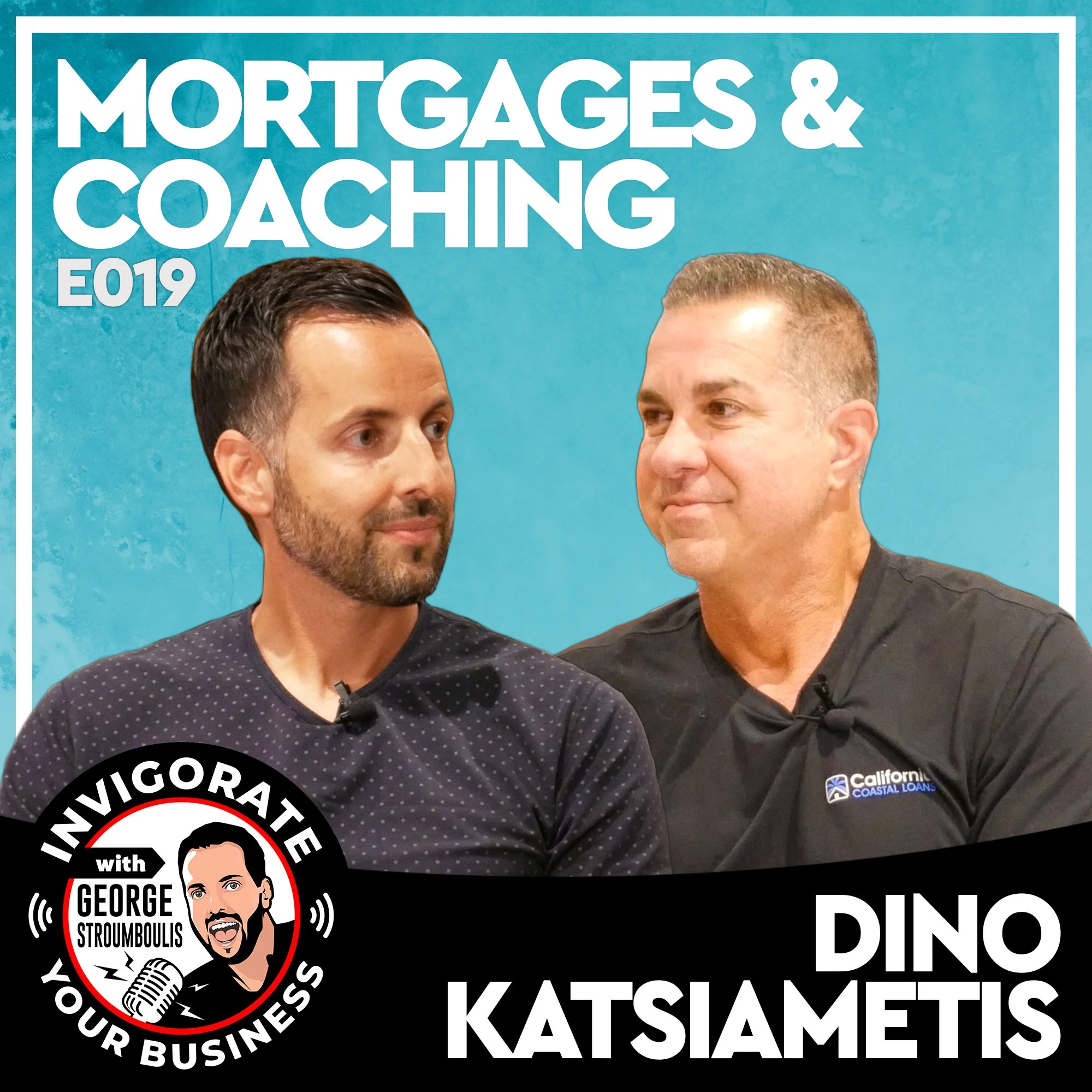
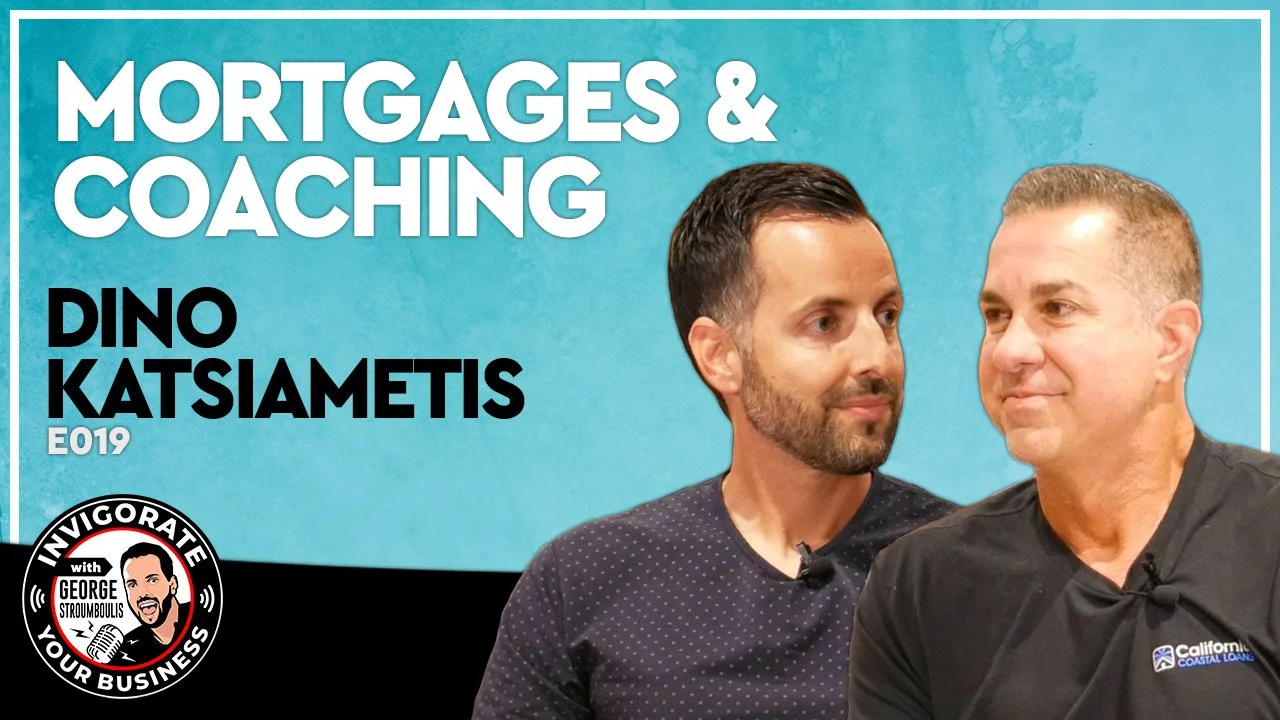
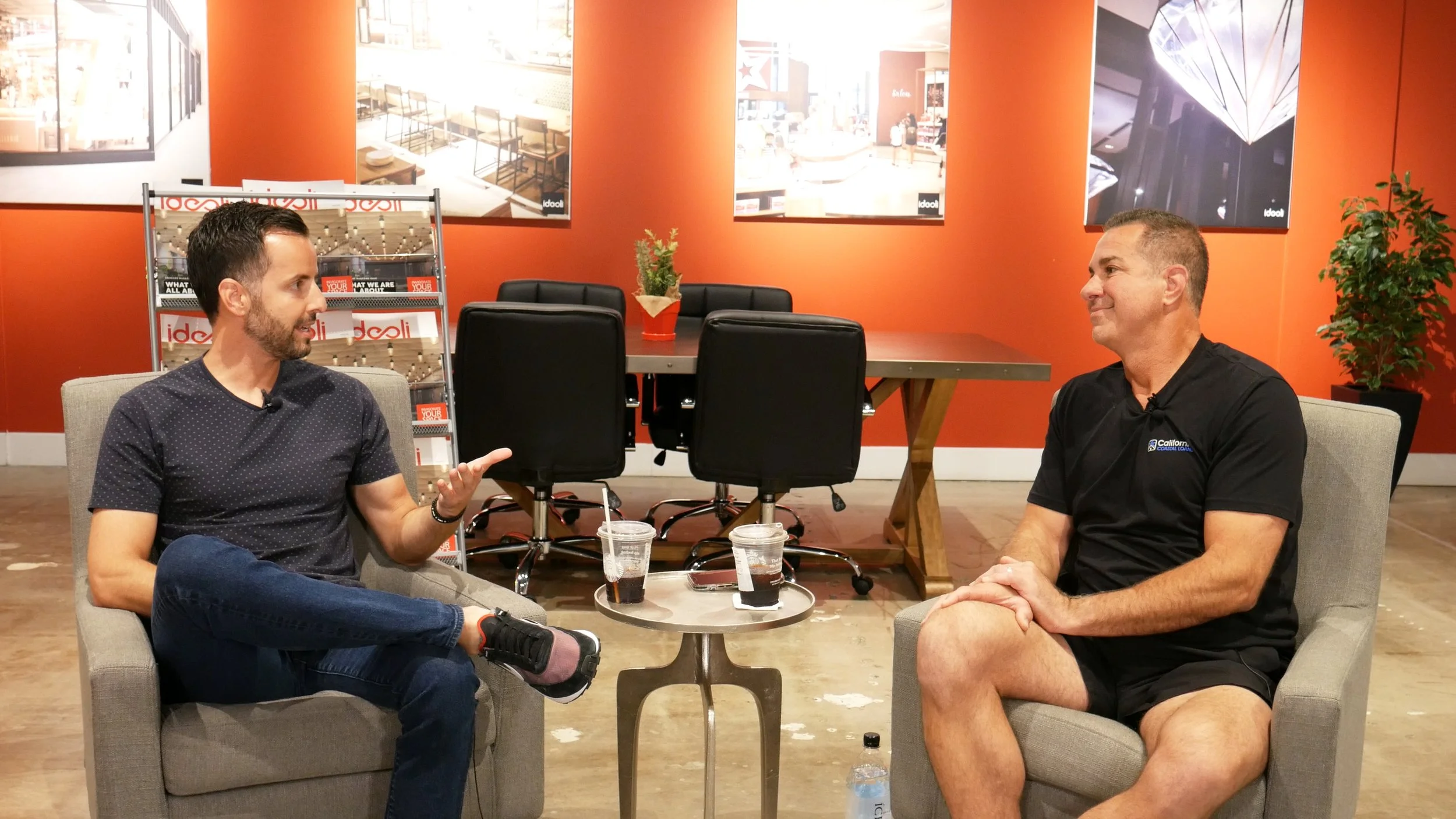
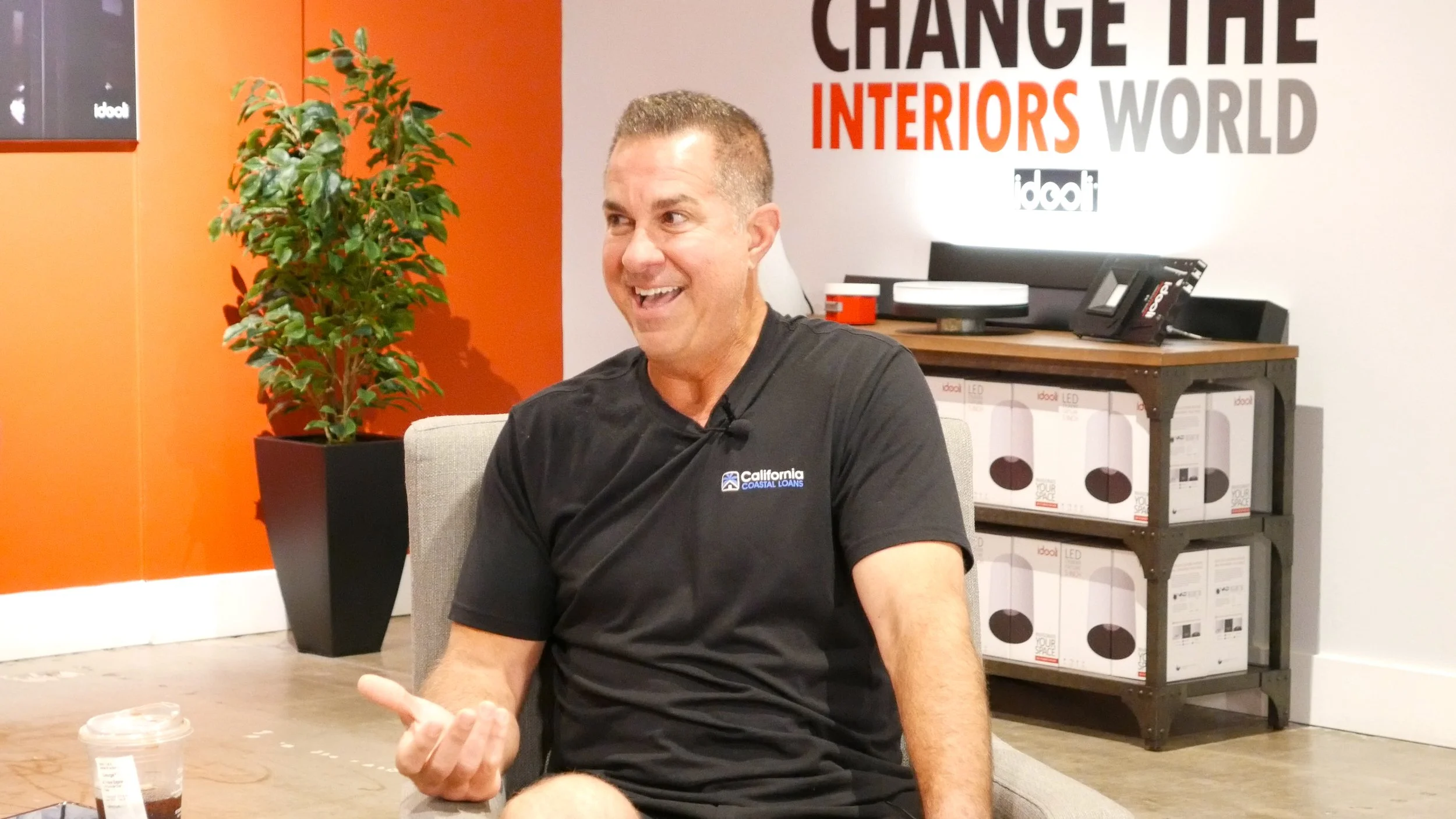
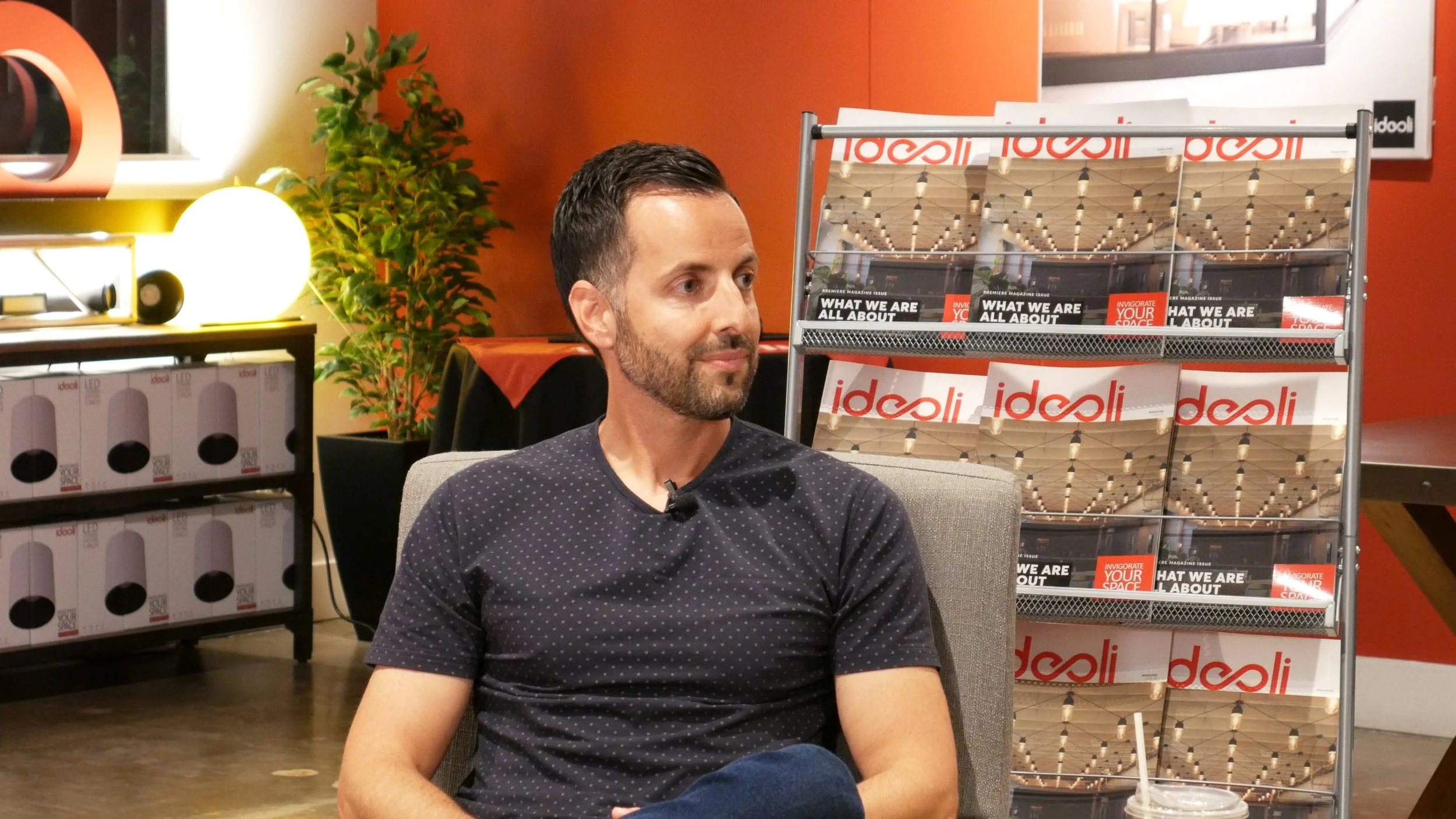
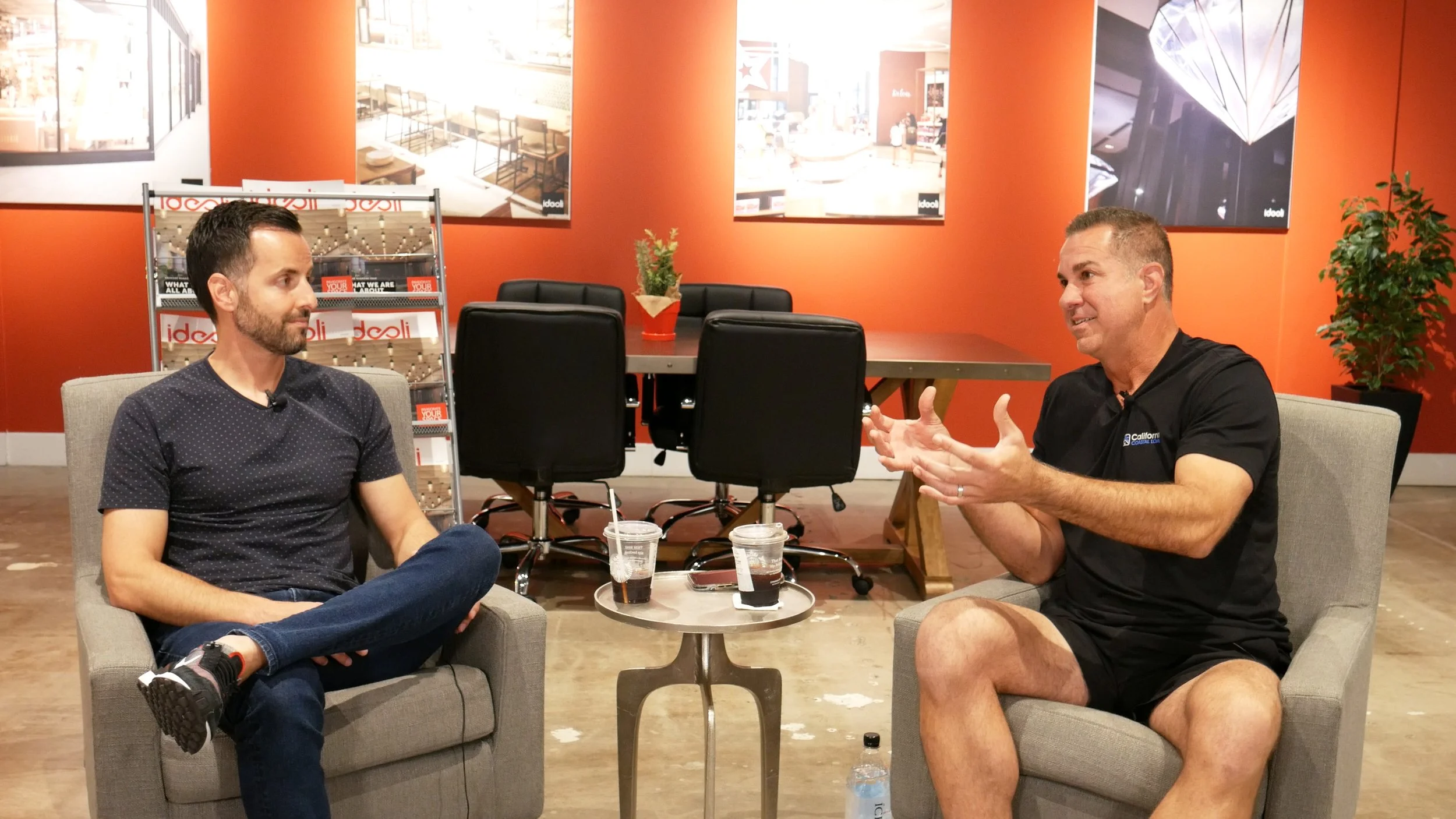
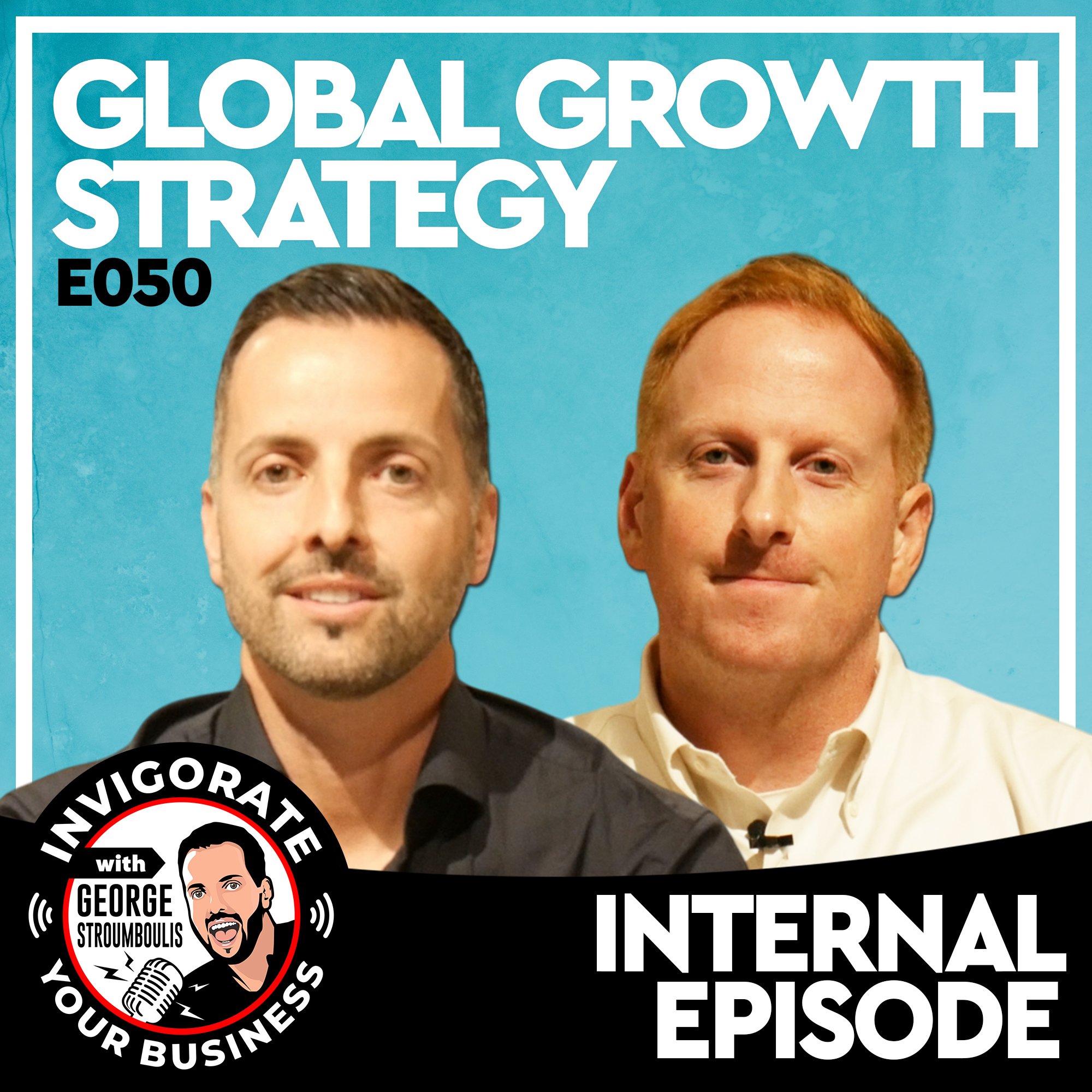


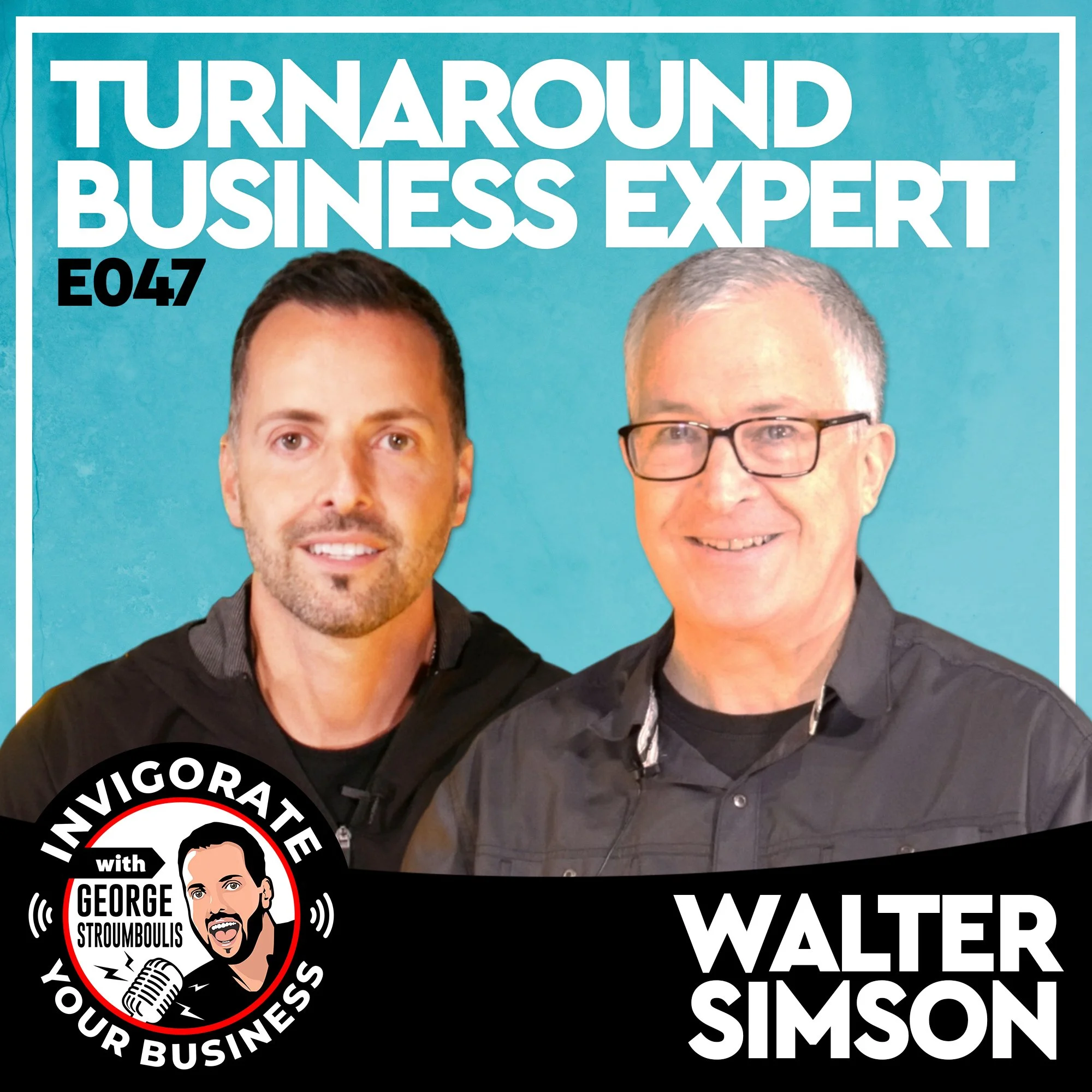
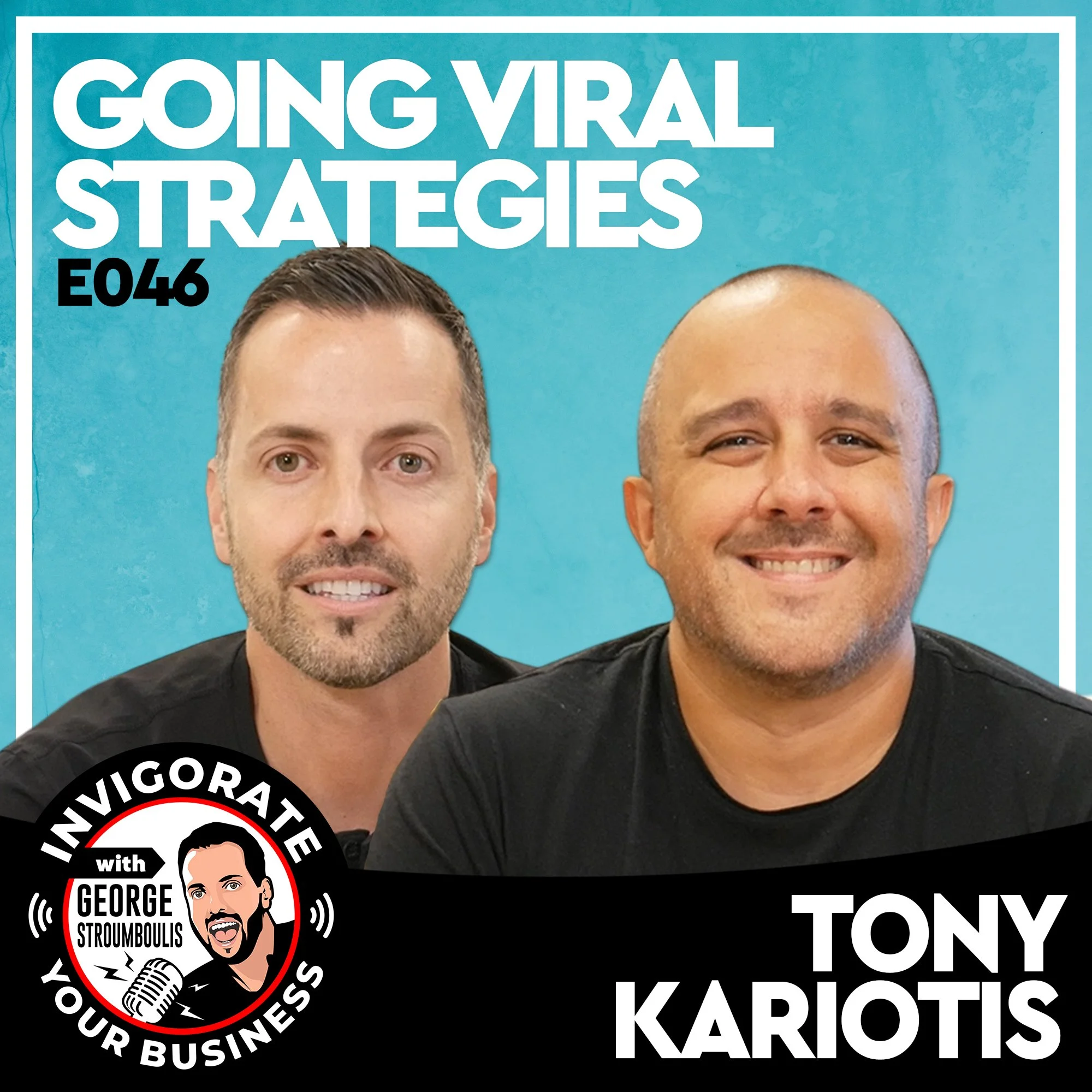

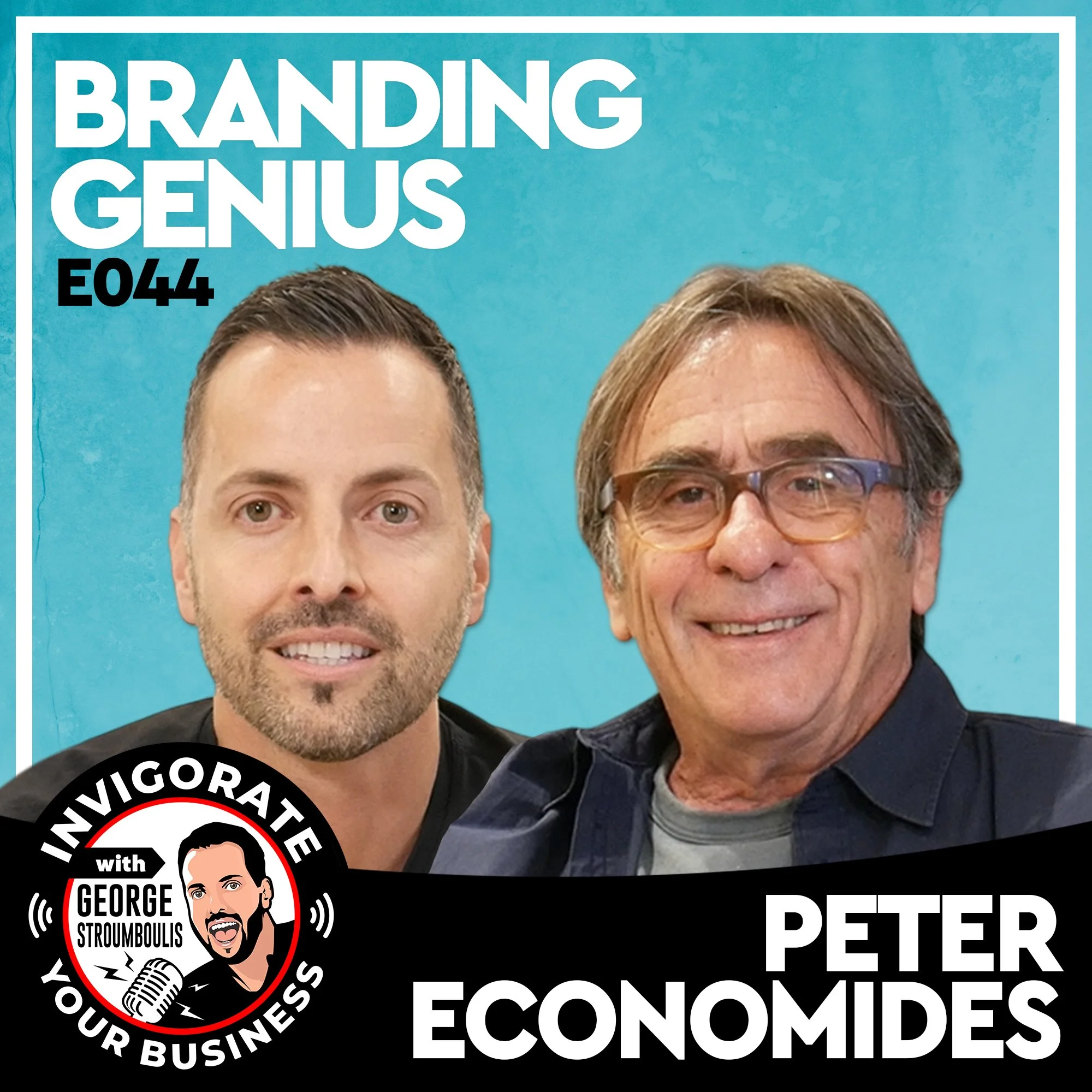
George Stroumboulis sits down with Jim Sogotis in Newport Beach, California on the Invigorate Your Business Podcast to talk about all things financial markets, investments, hedge funds, mutual funds, financial advice and so much more.